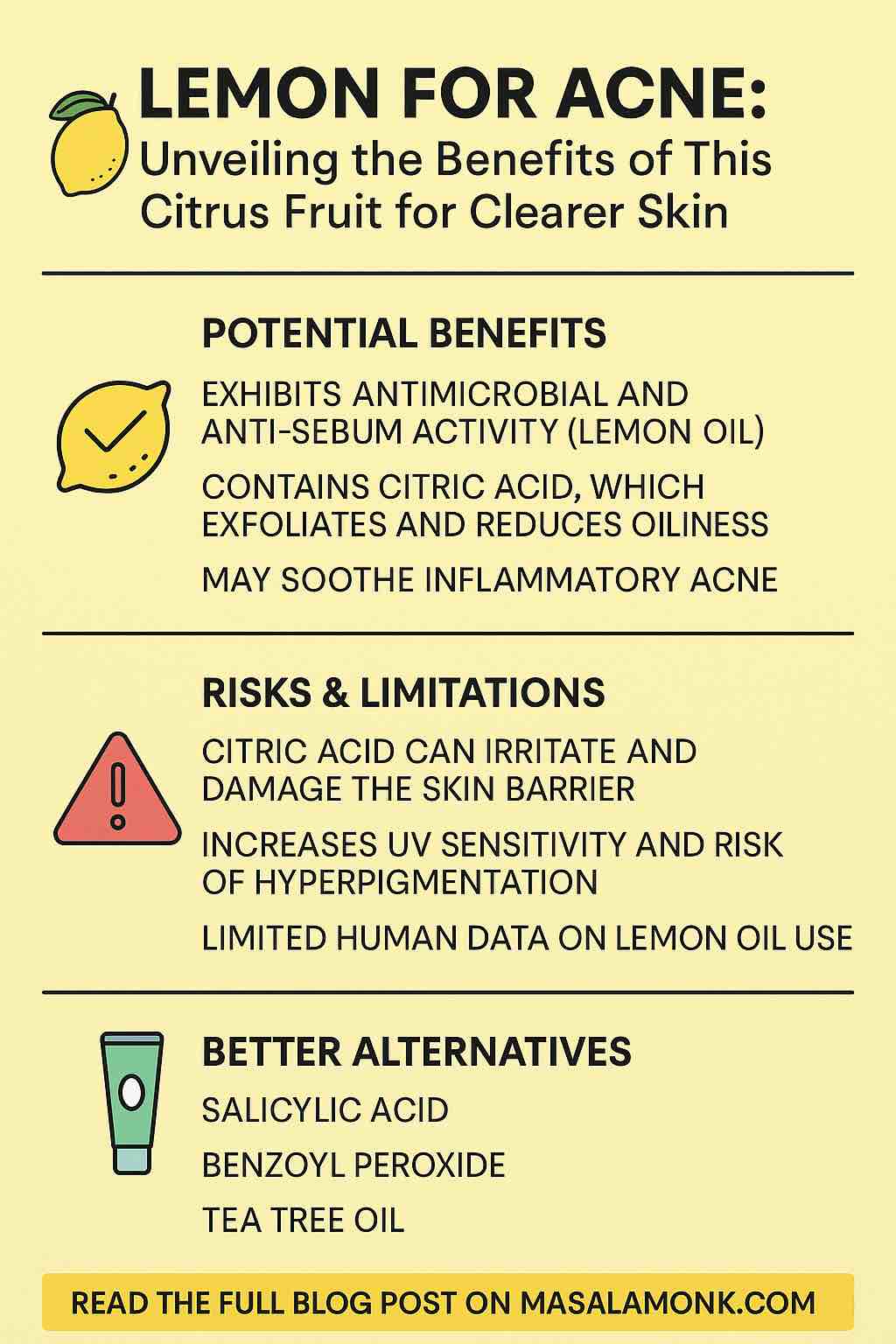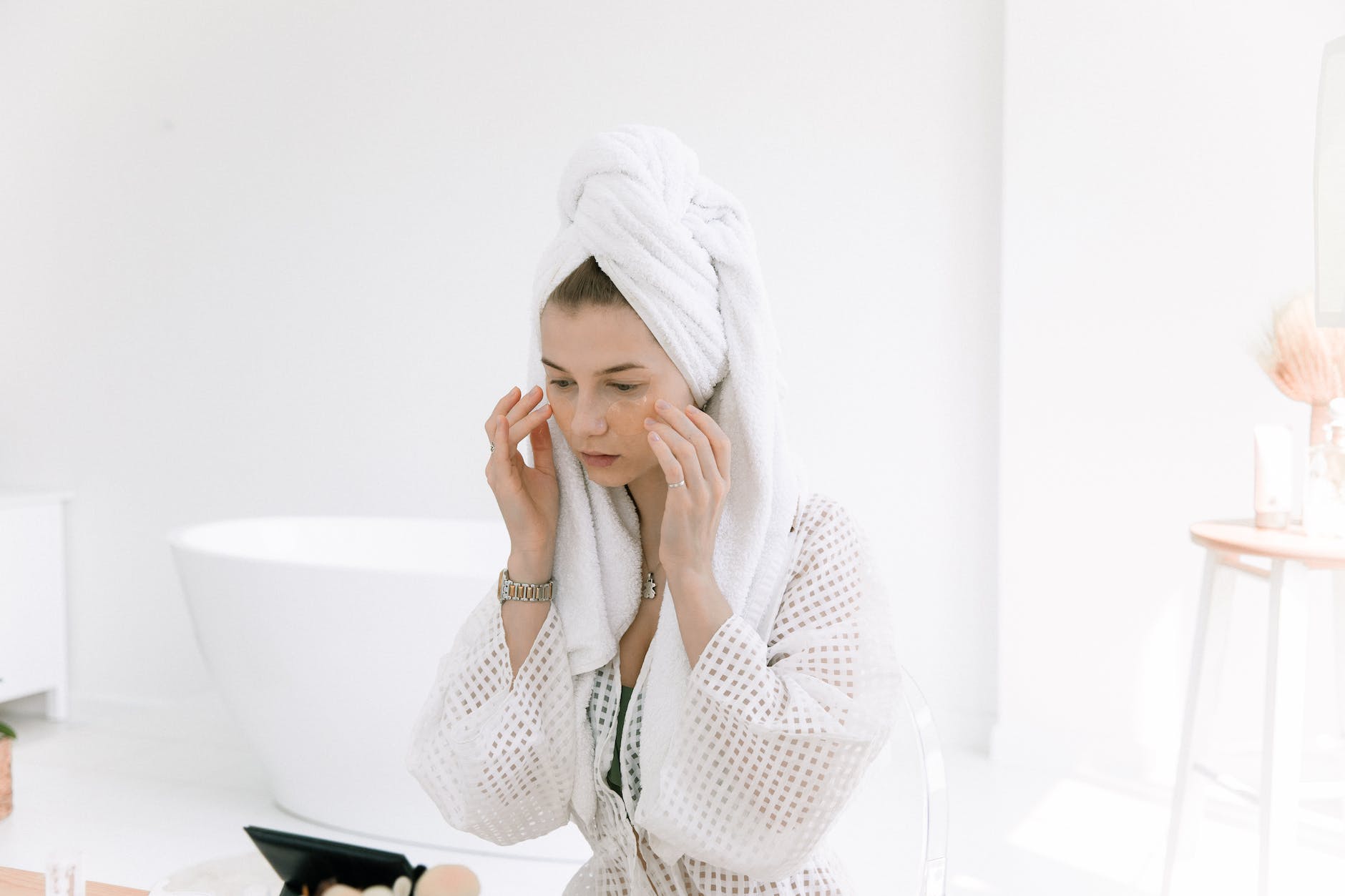
Acne is a persistent skin concern for millions across the globe. In search of natural solutions, many turn to their kitchens before their pharmacies. One of the most talked-about remedies is lemon. From DIY face masks to overnight spot treatments, lemon juice and lemon oil have been promoted as miracle cures. But does science support the hype? And more importantly, is it safe for your skin? Let’s dive into the facts, myths, and practical takeaways.
The Science Behind Lemon’s Skincare Claims
Key Active Components
Lemons are rich in:
- Citric Acid: A natural alpha hydroxy acid (AHA) known for exfoliating dead skin cells.
- Vitamin C (Ascorbic Acid): An antioxidant that may brighten skin and reduce hyperpigmentation.
- Limonene: A compound found in lemon peel with antimicrobial and anti-inflammatory properties.
- Flavonoids: Help combat oxidative stress and inflammation.
While these components have potential, context matters: concentration, delivery method, and skin type all influence outcomes.
Lemon Essential Oil in Lab Studies
Recent research (2024) shows that lemon essential oil demonstrates strong antimicrobial activity against acne-causing bacteria like Propionibacterium acnes and Staphylococcus epidermidis at low concentrations (MIC 0.25-0.5%). It also reduces sebum production in sebocyte cultures and inhibits comedone formation.
This suggests potential—but it’s important to note that these findings come from in vitro (lab) studies, not human trials.
Why Lemon May Help with Acne
- Exfoliates Dead Skin: Citric acid helps unclog pores, potentially preventing blackheads and whiteheads.
- Reduces Oiliness: Some evidence suggests lemon can reduce excess sebum—a key trigger of acne.
- Antibacterial Action: Active compounds can fight bacteria that cause breakouts.
- Lightens Acne Scars: Its acidic nature may help fade hyperpigmentation over time.
The Risks You Shouldn’t Ignore
Despite its benefits, lemon can pose several skin risks, especially when used incorrectly:
- Highly Acidic pH (~2-3): Can disrupt the skin barrier, leading to irritation, dryness, or even chemical burns.
- Photosensitivity: Compounds like bergapten increase UV sensitivity, leading to phytophotodermatitis (burns or dark patches when exposed to sunlight).
- Allergic Reactions: Citrus allergies are real and can cause itching, redness, or rashes.
- No Dosing Standards: The concentration of active compounds in lemon oil or juice isn’t standardized, which makes it hard to control its potency.
Dermatologists largely advise against using undiluted lemon juice directly on skin.
Practical Tips for Using Lemon Safely (If You Still Want To Try)
If you’re still keen on trying lemon-based remedies, follow these best practices:
- Use Essential Oil, Not Juice: Lemon essential oil is more stable and less likely to cause pH-related irritation.
- Dilute Properly: Mix a few drops (0.25%-0.5%) of lemon oil into a carrier oil like jojoba or sunflower.
- Patch Test First: Always test on a small patch of skin (like your inner arm) before full application.
- Use Only at Night: Avoid sun exposure immediately after use.
- Always Follow with SPF: Apply sunscreen the next morning to avoid phototoxic effects.
- Limit Frequency: 1-2 times per week is plenty.
Better Alternatives with Proven Efficacy
If you’re seeking safer, clinically backed treatments, consider these options:
- Salicylic Acid: A BHA that exfoliates inside pores and reduces inflammation.
- Benzoyl Peroxide: Kills acne-causing bacteria and helps reduce excess oil.
- Niacinamide: Reduces redness, regulates oil production, and strengthens the skin barrier.
- Tea Tree Oil: A natural option with proven antibacterial and anti-inflammatory effects.
- Buffered Vitamin C Serums: Deliver antioxidant benefits without the harshness of lemon juice.
Final Thoughts: Proceed with Caution
Lemon can offer antibacterial and exfoliating benefits in controlled lab environments—but that doesn’t translate directly to DIY skincare. The risks of irritation, burns, and long-term pigmentation outweigh the minimal benefits when applied raw or without guidance. If you still want to include lemon in your skincare routine, do so with caution, or better yet—choose clinically tested alternatives for clearer, healthier skin.
Have you tried lemon for acne? Share your experience or questions in the comments—we’d love to hear your story.
🔍 FAQs: Lemon for Acne
1. Can lemon juice really cure acne?
Lemon juice has antibacterial and exfoliating properties, but it’s not a cure. It may help mildly with acne, but risks like irritation and photosensitivity make it a less reliable option than dermatologist-recommended treatments.
2. Is lemon essential oil better than lemon juice for acne?
Yes. Lemon essential oil, when properly diluted, is more stable and less acidic than lemon juice. It has shown antimicrobial effects in lab studies, but it still needs to be used with caution due to phototoxicity risks.
3. Can lemon help fade acne scars?
Lemon juice may lighten dark spots over time due to its acidic nature and vitamin C content, but it can also cause post-inflammatory hyperpigmentation (PIH) in sensitive or darker skin types if used incorrectly.
4. Is it safe to leave lemon juice on my face overnight?
No. Leaving lemon juice on skin for extended periods, especially overnight, can cause chemical burns, severe dryness, and increased sun sensitivity. Always rinse it off within 5–10 minutes if you choose to use it.
5. Can lemon worsen acne or cause breakouts?
Yes. If your skin barrier is damaged or you’re prone to irritation, lemon juice can worsen inflammation, dryness, or lead to rebound oiliness—potentially causing more breakouts.
6. How often can I safely use lemon for acne?
If you choose to use lemon (diluted lemon oil or juice), limit application to 1–2 times per week, apply only at night, and always follow up with sunscreen the next day.
7. Does lemon juice contain vitamin C good for skin?
Yes, but in unstable form. Lemon juice has vitamin C, but it oxidizes quickly. Topical serums with stabilized L-ascorbic acid are safer and more effective alternatives for skin brightening.
8. What should I mix with lemon to reduce its harshness?
If using lemon juice, dilute with soothing ingredients like honey, aloe vera, or rose water. For essential oil, always mix with a carrier oil like jojoba or grapeseed oil.
9. Are there any skin types that should never use lemon?
Yes. Those with sensitive, dry, eczema-prone, or darker skin tones are at higher risk of irritation or hyperpigmentation from lemon use and should avoid it altogether.
10. What are safer alternatives to lemon for acne treatment?
Look for ingredients like salicylic acid, niacinamide, benzoyl peroxide, tea tree oil, or sulfur—all backed by research for effectiveness and safety.










